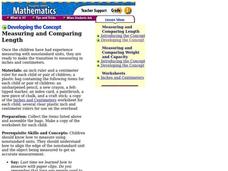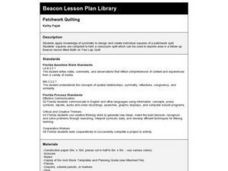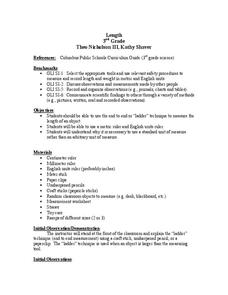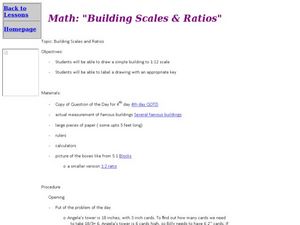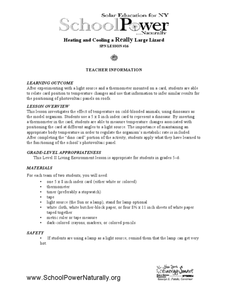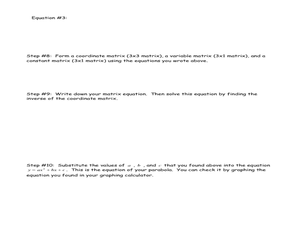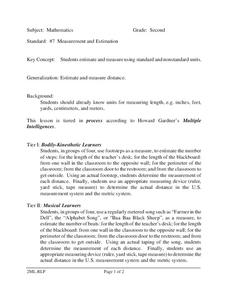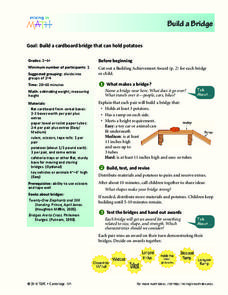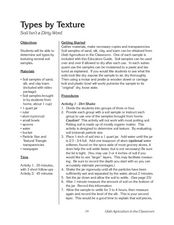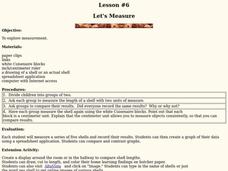Curated OER
Measuring and Comparing Length
First graders use rulers to measure in both standard notation and centimeters. In this measuring lesson, 1st graders discuss the importance of a measuring standard. Students measure in inches and centimeters. Students compare inches to...
Alabama Learning Exchange
How Old Is That Tree?
Fifth graders study environmental changes by examining the annual rings of a cross-section of a tree trunk. They access websites to complete a worksheet on the parts of a tree. They count the annual rings on a tree slice while observing...
Curated OER
Patchwork Quilting
Second graders use symmetry to create their own small quilt squares. They attach all of the squares to create a large class quilt.
Houghton Mifflin Harcourt
Explore Customary Units of Length - Practice 12.1
Give pupils a ruler and this worksheet so that they can practice measuring down to the quarter inch! Drawings of six various objects are depicted for them to apply their measurement skills to. The assignment concludes with one...
Curated OER
Length
Third graders examine and explore a variety of ways to measure length. They discuss how to measure large objects using the end-to-end method, and in small groups measure the length of the room using the end-to-end method with a...
Curated OER
Building Scales and Ratios
Students solve problems using scales and ratios. In this algebra lesson, students create drawings using scales of 1:12. They follow a key to help them draw different buildings using the right scales. They also complete word problems as a...
Curated OER
Heating and Cooling a Really Large Lizard
Students investigate the effect of temperature on cold-blooded animals, using a 5 x 8 inch index card to represent a dinosaur as their model organism. Students measure temperature changes that occurs at different angles to a light...
Curated OER
Quadratic Equations and Parabolas
Students graph and solve quadratic equations. In this functions lesson, students analyze a quadratic equation using three points on a curve to define the graph of a quadratic function. They find the vertex and intercepts of the graph.
Curated OER
Scaling in Maps
In this recognizing map scale ratios worksheet, students use ratios and centimeter measurements to calculate the distances in reality. Students solve 8 problems.
Curated OER
Wheel of Pharaoh
Students investigate ancient Egyptian civilization and its rulers. In this ancient history lesson, students simulate playing a game similar to Wheel of Fortune whereby students have to correctly guess all the letters that spell a word or...
Curated OER
Tissue Paper Bows
Students create holiday gift bows using tissue paper. They demonstrate creativity in making holiday bows using tissue paper. They demonstrate the ability to follow directions.
Curated OER
Conversions: Metrics Made Easy
Young scholars, in groups, measure and record each other's height. They identify measurement conversion methods and use online resources to convert measured heights to multiple systems.
Curated OER
18th Century Microscope
Young scholars examine a microscope from the 18th century. In this microscope lesson, students investigate how it works, what it was used for and how the tool has evolved through the years. Young scholars also build knowledge on how...
Curated OER
Measurement and Estimation
Second graders explore estimation and measurement. In this estimation and measurement lesson, 2nd graders use footsteps to measure distances around the classroom. Students sing songs to measure the number of beats from one area to the...
Curated OER
Build a Cardboard Bridge That Can Hold Potatoes
Students identify the characteristics of a bridge and build with junk materials. In this bridge building lesson, students use cereal boxes, paper towel or toilet paper tubes and tape to create their bridges. Bridges must...
Curated OER
3-D Model of Lake Benthos
Students create 3-D models of Lake Benthos. In this scale drawing lesson, students create a 3-D model of Lake Benthos. Students work in groups to create the models. Students use the models to to encourage people to conserve natural...
Curated OER
Measuring Up on the Mayflower
Second graders use a meter tape to compare the length of the Mayflower to a basketball court and make homemade butter for crackers. Afterward, all students sit inside the makeshift Mayflower's dimensions and enjoy their Pilgrim butter.
Curated OER
It's All About Scale
Sixth graders investigate scale models of toys. In this scale models of toys lesson, 6th graders bring in toys from home to measure. Students discuss scale and what scale is used with their toys. Students determine the...
Curated OER
28 Days - The Lunar Cycle time line
Third graders create a labeled lunar diagram time line illustrating the lunar cycle using Internet resources. An assigned date/month is given to each student, and an online Moon Phase calculator assists them with their drawings.
Curated OER
Types by Texture: Soil Isn't a Dirty Word
Second graders experiment with different types of soil to find the texture. In this types of soil experiment, shake a jar of soil and water and record the settling of the soil. Students record again after 3-4 hours and note the level...
Curated OER
Let's Measure
Students measure shells using 3 different methods. In this measurement lesson plan, students work in two groups to measure the length of a shell using two different units of measure. The groups compare their results, measure...
Curated OER
Measurement: Perimeter and Area
In this perimeter and area lesson, students learn the formulas for perimeter and area and view model problems using tiles. Students work in groups to solve practice problems. Students define perimeter and area and explain why...
Curated OER
Special Effects-Titanic and Beyond
Students view a video clip about special effects. They use geometry to determine how it changes one's perspective. They work together to construct their own room and comparing their room with other groups, noting the type of...
Curated OER
Filling the Glass (Water, Air, and Fractions)
Students predict which of two glasses is 1/2 full using visual estimation, height measurement, and liquid measurement methods. Mathematical equations to accurately solve the problem are determined and verified.
